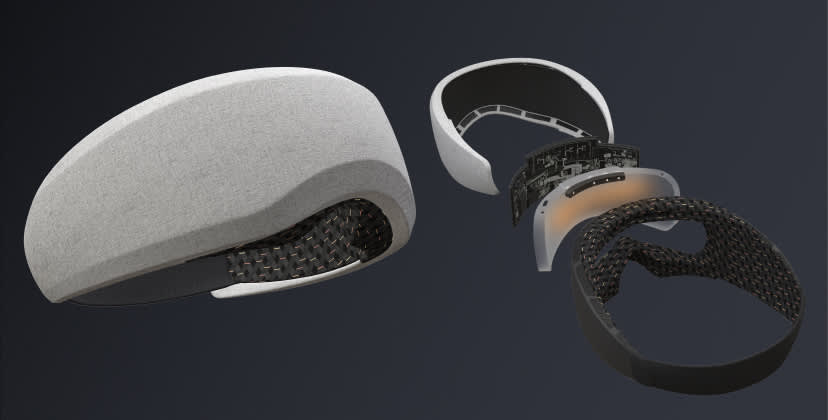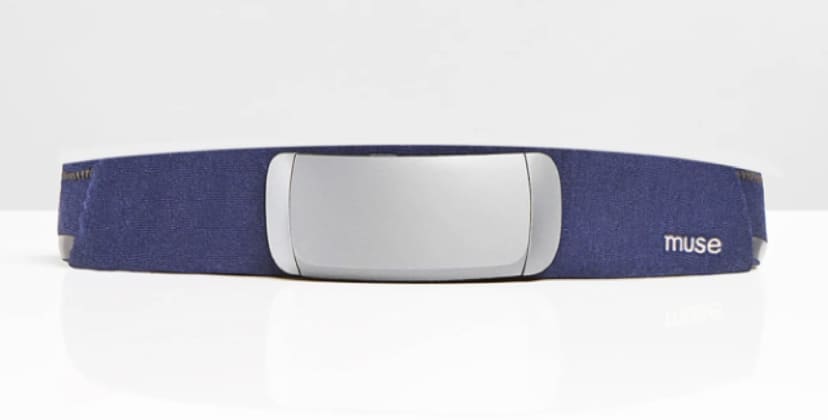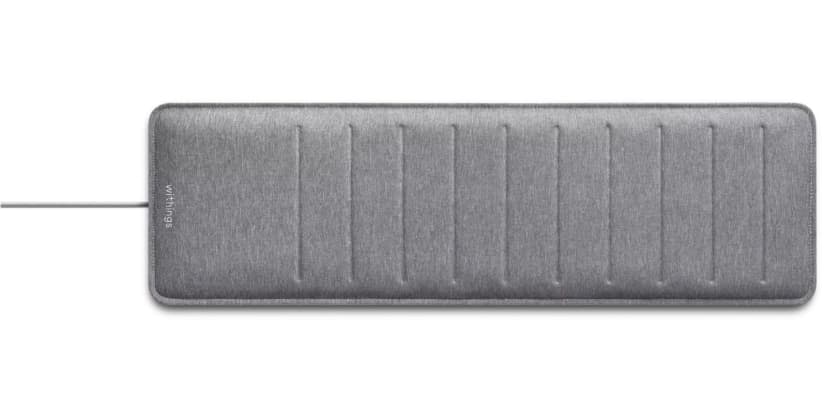When you buy through our links, we may earn a commission. Products or services may be offered by an affiliated entity. Learn more.
Best Sleep Trackers of 2025: Data That Matters
Numbers don’t lie.
You’ve probably heard this applied to business or sports, but it’s becoming increasingly relevant to sleep thanks to emerging technology found in sleep trackers.
With a sleep tracker, you can get a clear look at the quantity and quality of your sleep on a nightly basis, and it can also help identify sleep problems. Many include built-in coaching to improve your sleep habits and can also track progress to see how well different strategies work over time.
Sleep trackers vary based on a number of different factors, from the technology they use to the sensors that monitor your sleep. Our testing team took dozens of them for a spin to see which ones offered the usability and features worthy of a spot on our list of the best trackers of 2025.
Our Top Picks
-
Best Overall – Oura Ring 4
View Details
-
Best for Active People – WHOOP 4.0
View Details
-
Best Sleep Reports – Rise Science Sleep Tracker
View Details
-
Best Multipurpose Tracking – Bía Smart Sleep Mask
View Details
-
Best Features – Muse S Headband Sleep Tracker + App
View Details
-
Best Non-Wearable – Withings Sleep
View Details
Swipe for more
Best Overall
Oura Ring 4
9.1 /10
Test Lab Score
Oura Ring 4 is a wearable sleep tracker that monitors an impressive array of metrics to evaluate your sleep and daytime activities. The sleek, lightweight design makes it one of the most attractive wearable sleep trackers you’ll find on the market.

Price
$349
Sleep Tracker Type
wearable – ring
Our Verdict
Why We Picked It
Offered in multiple styles and finishes, Oura Ring 4 has a stylish look that complements its in-depth tracking of sleep and daily activity. One charge gets you up to eight days of battery life, and the titanium build is lightweight and gentle on your skin.
Key Features
Oura Ring 4 is equipped with sensors that measure your heart rate, temperature trends, and blood oxygen levels throughout the day and night. It translates this data into three scores — Sleep Score, Activity Score, and Readiness Score — to illuminate trends in your sleep and how sleep affects your daily life. Oura Ring 4 also serves as a fitness tracker and a trusted guide that provides tips to optimize your health.
What We Don’t Like
In order to fully access Oura Ring 4’s features, you must download the Oura App and pay for a monthly membership.
Best for Active People
WHOOP 4.0
8.8 /10
Test Lab Score
The WHOOP 4.0 builds on its predecessor with a lighter, more compact design and more enhanced tracking capabilities. While the WHOOP tracker is designed with a wearable wristband, the sensor can be detached from the band and used with different garments such as sports bras, compression tops, leggings, athletic boxers, and intimates.
Price
$239
Sleep Tracker Type
wearable – wristband
Our Verdict
Why We Picked It
The WHOOP tracker is the best sleep tracker for active people. Designed to be worn as a wristband and powered by a long-lasting battery, the WHOOP 4.0 gathers detailed data about your sleep and works as a high-level fitness tracker.
Key Features
The WHOOP sleep tracker is comfortable to wear with a wristband but can also be used with other garments, like a sports bra or compression top. It helps optimize sleep by monitoring your heart rate, respiratory rate, blood oxygen levels, and skin temperature.
The WHOOP tracker also features a smart alarm designed to prevent grogginess by gently waking you up during the ideal moment in your sleep cycle.
What We Don’t Like
WHOOP is a subscription-based service, so you’ll have to pay recurring monthly charges to access the data that the device collects.
Best Sleep Reports
Rise Science Sleep Tracker
8.7 /10
Test Lab Score
The Rise Science Sleep Tracker is an app that can be used with wearable devices or on its own. Rise connects with health apps on your phone to track your sleep debt and circadian rhythm to help optimize your sleep duration.
Price
$70
Sleep Tracker Type
Monthly, yearly
Our Verdict
Why We Picked It
The Rise Science Sleep Tracker is our recommended app for people who want the highest-quality sleep reports. This tracker can integrate various sources of data to identify when you’re short on sleep and suggest ways to enhance your sleep habits.
Key Features
The Rise Science Sleep Tracker is an app that generates detailed reports with your sleep data. That data comes from your phone, but you can also connect the Rise tracker with other health apps or a wearable device to generate more robust reports.
The Rise tracker calculates your sleep debt and draws on the science of circadian rhythm and sleep hygiene to recommend tailored strategies to get more restorative sleep.
What We Don’t Like
Unless you connect the Rise Science Sleep Tracker to a wearable device, the type of data it collects is more limited than many other sleep trackers. After an initial trial period, you have to pay a monthly subscription fee to keep using the Rise app.
Best Oxygen Level Tracker
Sleepon Go2Sleep 3 Tracker
8.9 /10
Test Lab Score
$10 off with code: 10off
$10 off with code: 10off
The Go2sleep 3 Tracker from Sleepon offers a wide array of data for its price-point. This device provides a significant amount of valuable information for shoppers who want to learn more about their sleep and overall health.
Price
$129
Sleep Tracker Type
wearable – ring
Our Verdict
Why We Picked It
The SLEEPON Go2Sleep 3 Tracker is our favorite sleep tracker for monitoring your blood oxygen level continuously during sleep. It is a ring made of silicon that syncs with your phone and can identify dips in blood oxygen, which may help detect underlying sleep-related breathing disorders. The Go2Sleep 3 also monitors blood glucose levels.
Key Features
In addition to measuring blood oxygen levels, the Go2Sleep 3 Tracker monitors your heart rate and uses an algorithm to analyze your sleep stages and overall sleep quality. It can provide alerts if your blood oxygen level drops too much, and a new feature gives insight into your blood glucose levels.
What We Don’t Like
The shape and weight of the ring can take time to get used to. The tracker requires recharging roughly every other day.
Best Multipurpose Tracking
Bía Smart Sleep Mask
8.6 /10
Test Lab Score
The Bía Smart Sleep Mask takes a straightforward design to unparalleled levels. The mask serves its core purpose of helping you stay asleep in the absence of complete darkness, with a full blackout effect to ensure no light whatsoever, but this function is just the tip of the iceberg.

Price
$419
Sleep Tracker Type
wearable – sleep mask
Our Verdict
Why We Picked It
For a multipurpose sleep tracker, the Bia Smart Sleep Mask takes the top spot. It uses advanced technology to monitor brain activity and track your sleep stages. It also blocks out external light, offers a simulated sunrise wake-up function, and plays relaxing music tailored to help you fall asleep quickly.
Key Features
The Bia Smart Sleep Mask is packed with features, including the ability to track your sleep stages through brain-monitoring technology called Functional Near Infrared Spectroscopy (fNIRS). The mask is configured with neurofeedback techniques to guide you to sleep, and there are separate modes for evening sleep, napping, meditation, and overcoming jet lag.
What We Don’t Like
The Bia Smart Sleep Mask is more expensive than most sleep trackers. It isn’t a good option for people who are uncomfortable wearing something on their face at night.
Best Features
Muse S Headband Sleep Tracker + App
8.7 /10
Test Lab Score
The Muse S Headband Sleep Tracker is a wearable device that tracks an impressive number of sleep metrics. If you purchase the Muse app, you’ll also receive access to instructional meditation programs and hundreds of guided meditations.

Price
$445
Sleep Tracker Type
wearable – headband
Our Verdict
Why We Picked It
The Muse S Headband Sleep Tracker and App boast an impressive list of features, including sensors that collect a diverse range of data about your sleep. The tracker is designed to pair with Muse’s app and build synergy between your sleep and a regular meditation practice.
Key Features
The headband has sensors that measure brain activity to gauge the amount of time you spend in different stages of sleep. It also tracks movement, heart rate, and breathing. The Muse S Headband works in tandem with the app to enhance meditation and breathwork based on the data collected by the built-in sensors.
What We Don’t Like
Some sleepers may find it uncomfortable to wear a headband during the night. An annual subscription is required to get the most out of the mediation app.
Best Non-Wearable
Withings Sleep
8.6 /10
Test Lab Score
The low profile of the Withings Sleep allows it to unobtrusively collect data on your sleep experience from underneath your mattress. Sensors in the device detect heart rate, breathing, and movement, and this data is processed to produce reports on your sleep cycle, heart rate, and breathing, with an overall sleep score.

Price
$129
Sleep Tracker Type
non-wearable
Our Verdict
Why We Picked It
Our award for the best non-wearable sleep tracker goes to the Withings Sleep device. It slides under your mattress to collect a wealth of data that is documented in a daily sleep report and sleep score.
Key Features
The Withings Sleep device unobtrusively gathers data that helps track your heart rate, movement, breathing, and snoring. You don’t have to wear it on your body, so there’s no risk of discomfort or skin irritation. The device can sync with smart home devices to coordinate light levels and room temperature based on whether you’re awake or asleep.
What We Don’t Like
The device isn’t compatible with mattresses that are more than 15 inches thick.
Best Overall
Oura Ring 4
9.1 /10
Test Lab Score
A sleek, cutting-edge sleep tracker that fits comfortably on your finger.
See More Details

Best for Active People
WHOOP 4.0
8.8 /10
Test Lab Score
A sleep-tracking wristband equipped with “Any-Wear” technology for added versatility.
See More Details
Best Sleep Reports
Rise Science Sleep Tracker
8.7 /10
Test Lab Score
A handy sleep-tracking app that’s compatible with your wearable devices.
See More Details
Best Oxygen Level Tracker
Sleepon Go2Sleep 3 Tracker
8.9 /10
Test Lab Score
$10 off with code: 10off
Shop at SleeponA lightweight silicone ring engineered to track key metrics while you sleep.
See More Details
Best Multipurpose Tracking
Bía Smart Sleep Mask
8.6 /10
Test Lab Score
A smart sleep mask that tracks data while shielding you from disruptive light.
See More Details

Best Features
Muse S Headband Sleep Tracker + App
8.7 /10
Test Lab Score
A high-tech headband that tracks brain activity and overall sleep quality.
See More Details

Best Non-Wearable
Withings Sleep
8.6 /10
Test Lab Score
A sleep mat embedded with sensors to monitor key metrics during the night.
See More Details

Best Sleep Trackers Video
Watch the video below to learn more about our recommendations for the best sleep trackers.
What Is a Sleep Tracker?
A sleep tracker is a device that gathers information related to how much or how well you sleep.
Because sleep is complex, there’s no single measurement that perfectly reflects whether or not you’re getting a good night’s sleep. To address that, sleep trackers first collect raw data and then use an algorithm to interpret what the data says about your sleep.
For example, a sleep tracker might measure how much physical movement you have during the night. If it detects that you were out running a 5k at 4 a.m., it can easily calculate that your sleep was lacking.
Of course, the reality is much more nuanced. Depending on the type of tracker and its sensors, it may monitor:
- Breathing rate
- Heart rate
- Oxygen levels in your blood
- Body movements
- Noise, including from snoring
- Bedroom temperature
Sleep trackers can be a wearable device like a bracelet or ring. They can also be non-wearable sensors that sit on your bedside table or under your mattress.
Unlike mobile phones and GPS devices, a sleep tracker is engineered specifically to deliver sleep-related insights. Although other devices may collect some similar data, they lack the detail and depth of information offered by a sleep tracker.
Who Should Use a Sleep Tracker?
You should use a sleep tracker if you’re curious about how well you’re sleeping and are looking for ways to get better sleep. Most trackers come with tools to visualize and understand the data and often provide actionable steps to enhance sleep habits.
If you are having difficulty sleeping, a sleep tracker can be a source of relevant information to share with your doctor. Sleep trackers can also help if you have an irregular work schedule and want to keep an eye on the quantity and quality of your sleep.
Sleep trackers are also extremely popular among people who like to measure and optimize different aspects of their lives. For example, athletes and fitness enthusiasts frequently take advantage of insights from sleep trackers to boost their performance and overall health.
Who Shouldn’t Use a Sleep Tracker?
You shouldn’t use a sleep tracker if you’re someone who gets anxious or obsessive about daily health measurements. Worrying too much about “hitting your sleep numbers” can generate stress, which is known to harm sleep.
You also shouldn’t use a sleep tracker as a way to avoid seeing a doctor about serious sleep problems, such as insomnia or constantly dozing off during the day. If you have sleep concerns, a sleep tracker may help, but it should be used in conjunction with advice from a trained health professional.
Are Sleep Trackers Accurate?
Sleep trackers can provide meaningful data, but they aren’t perfectly accurate. Technology in sleep trackers has come a long way, but even sleep experts can’t say exactly how well they measure sleep.
To assess accuracy, a tracker should be compared head-to-head with a home sleep test or a formal sleep study, which takes place overnight in a specialized lab. This type of comparison is not always practical, though, especially since sleep trackers are constantly being updated with new features and technology.
Just remember that your sleep tracker’s findings are not the end-all, be-all. Instead, use the tracker to identify patterns in your sleep and potential areas for improvement while also accounting for things that the tracker doesn’t monitor, like how well-rested you feel when you wake up and how energetic you are throughout the day.
How To Choose a Sleep Tracker
If you want to learn more about your sleep, you have plenty of sleep trackers to choose from. Knowing about the types of trackers and the different features and benefits can help you find a model that will be easy for you to use and give you the information you’re looking for.
Type of Tracker
While we use the term sleep tracker broadly, there are many different types of devices available.
- Wearables for your hand or wrist: This popular category includes rings, wristbands, and advanced smartwatches. They tend to be lightweight, and many can collect health data throughout the day instead of just during sleep.
- Wearables for your head: Headbands and eye masks are the most common sleep trackers that you wear on your head. They are typically meant just for use during sleep. Many have the potential to measure brain activity, which can be a valuable source of data about sleep.
- Under-mattress sensors: These non-wearable trackers go underneath your mattress and collect data over the course of the night. They are an effective and affordable option if you find it bothersome to wear a tracker.
- Smart mattresses: Some technologically advanced mattresses have sensors in the cover that can track sleep. This type of tracker may be a compelling choice if you are also in the market for a new mattress and don’t need daytime activity tracking.
- Smartphone apps: Apps are generally less robust than other sleep trackers because the range of data they collect is limited. However, some apps can provide meaningful data or integrate information from other sources, including wearables.
When deciding which type of tracker is right for you, think about the type of data you want, including whether you want information about your daytime activity or fitness. Also consider whether you’ll be comfortable wearing a device on your head, hand, or wrist while you sleep.
Sleep Data Collected
Make sure to look for a sleep tracker that has sensors to collect the data that’s most important to you. For instance, if you’re concerned about your breathing at night, you’ll want a tracker that measures respiration. Before making a purchase, look closely at exactly what a tracker monitors.
Sleep Analytics and Coaching
Every sleep tracker collects data, but there can be a lot of variation in how that data is analyzed and presented to you.
With some sleep trackers, you’ll get an overall sleep score or charts that help visualize your sleep quantity or quality. Keep in mind, though, that the data analysis is based on the company’s own algorithm, which will have some margin for error. Even the most advanced sleep trackers may not accurately identify sleep stages.
Think about the kind of analytics that would be most meaningful for you, and also consider whether you want a tracker that proactively offers you sleep tips. Make sure that whatever model you buy offers the type of information you need.
Comfort
If you’re like most sleepers, comfort is paramount. You’ll need the tracker to monitor your sleep over many hours, so don’t pick a device that will be a nuisance for you to use or wear.
Battery Life
Most wearable trackers need to be recharged at least once every few days. More frequent charging is usually needed if you want to track daytime activity or workouts.
In contrast, non-wearables can often be plugged in while you sleep, eliminating the need to charge them.
Not sure how much battery life matters to you? Think about your mobile phone and how sensitive you are to whether it’s charged. If it drives you crazy to see the battery drain quickly, look for a sleep tracker with extended battery life.
Display & Apps
For sleep tracking to benefit you, you need to be able to easily understand the information presented to you. Most sleep trackers use a website or app to share sleep analytics, so look for one that has an interface that appeals to you.
Most companies that sell sleep trackers will have screenshots of their user interface on their website. You can look in the Apple or Android App Store for reviews and screenshots of the companion apps of different sleep trackers.
Other Features and Functions
You can narrow down your sleep tracker options if you know that you want one or more specific features, such as:
- Smart alarms or a built-in sunrise alarm clock
- Fitness tracking
- GPS functionality
- Health coaching and motivation
Price
Sleep trackers often cost between $100 and $400, but comparing prices can be challenging because many sleep trackers require you to have a monthly subscription. When thinking about your budget, make sure to take into account whether it’s a one-time or recurring cost.
How to Shop for a Sleep Tracker
Once you’ve narrowed down your options and are choosing among a few sleep trackers, a few factors may help guide your decision:
- Tech compatibility: It can be easy to overlook when thinking about other features, but you want to ensure that the sleep tracker and any companion app are compatible with your computer or mobile phone.
- Verified reviews: Reading reviews from real customers can often provide input about a specific feature or usability issue that may be especially relevant to you.
- Brand reputation: If all else is equal, opt for a brand with a history of building quality products and providing good service to their customers.
- Warranty: A warranty can help protect your investment. While warranty length is obviously important, it’s also worth looking at the warranty terms to understand what is really covered.
- Returns: If you’re on the fence, try to pick a sleep tracker that comes with a trial period allowing free returns if you aren’t satisfied with the product.
In-Store vs. Online Shopping?
For sleep trackers, it’s usually better to shop online. The selection in brick-and-mortar stores is often limited, and some brands of sleep trackers are only sold online.
Shopping online lets you browse at your own pace, research the different options, and make a decision when you’re ready. In most cases, you’ll also get the best price by comparison shopping online.
The main reason to consider going to a retail store is that you can see how a wearable device actually feels in real life. That said, if you buy online with free returns, you’ll have a much longer period to test out a sleep tracker for yourself.
How We Test
To test sleep trackers, we use a detailed methodology that combines data points from multiple sources. In our Test Lab in Seattle, we take sleep trackers out of the box and give them a spin. We see how well they work and look carefully at their app or web interface.
We consult with field testers and other people experienced in evaluating consumer technology. Then we cross-check their reports with verified product reviews.
Our testing team incorporates all of this information into our final recommendations for the best sleep trackers in multiple different categories.
In-Depth Sleep Tracker Guides

Still have questions?
Our product experts have extensive experience testing just about every sleep product on the market.
Send an email to [email protected] with your questions and we’ll help you find exactly what you’re looking for.
